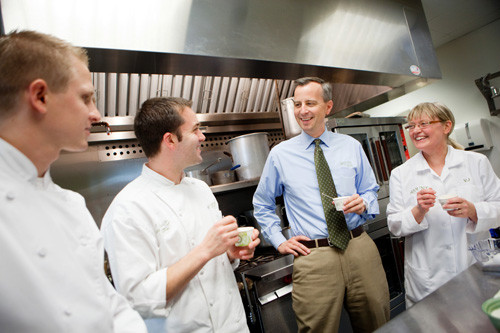
The recipe for success at Blount Fine Foods involves three steps: understanding the changing tastes of consumers, adding new products to meet those demands and sticking with that strategy, even through the worst of the recent economic downturn.
Judging by the numbers, that plan has put Blount on the fast track. Sales figures for the soup and seafood company have been rising steadily, from $59 million in 2007 to $95 million this year. The employee head count is up, too; over the past five years Blount has added 40 jobs. And in early spring of this year the company broke ground on a new 58,000-square-foot facility that will double existing space at their Fall River headquarters.
That record of achievement – through the worst economy since the Great Depression – are why Blount Fine Foods claims the 2010 Providence Business News award for overall excellence among companies with more than 100 employees.
“When everyone else was trying to reduce costs with cuts to sales and marketing, we decided to go in the opposite direction,” said company President Todd Blount, who has seen sales figures triple since he took over leadership of the family business in 2000. “We’re adding some new product lines – gourmet dips, gourmet chicken salad, seafood salad and some other things. Between those new lines and organic growth, we should fill up space in our new facility in five years.”
The Blount family entered the food business in the 1880s with a small operation that shucked and cleaned oysters caught in Narragansett Bay. In 1946, T. Nelson Blount launched Blount Seafood Inc. (still the company’s corporate name) and set up a plant in Warren that processed quahogs used in canned soups. That facility continues to process seafood, but that’s now just one part of the business.
Today the company is best known for its own soups, everything from Pumpkin Bisque to Big Game Chili. You won’t find them in the aisles for canned goods. Blount soups are sold at supermarket deli counters refrigerated or frozen, or served piping hot at restaurants. Some of those eateries are small, family operations; others, national chains. Shaw’s, Stop & Shop, Hannaford, Sam’s Club, BJ’s Wholesale and Costco all carry Blount soups, under dozens of different brand labels.
“Even though the recession is still here, people continue going into the deli area of their supermarket to look for high-quality, prepared foods,” Todd Blount said. “You can go into a supermarket and get our soups hot to go, or prepacked in cups to be heated at home. And while the restaurant business has been down, our sales to restaurants have grown through our sales and marketing efforts.”
The first efforts to diversify came in the 1980s, with stuffed clams, chowder and a few other seafood items. When Blount, then 32, took over leadership of the company from his father a decade ago, he was eager to move further in that direction. He had already hired a marketing expert, Bob Sewell, and together they launched a plan to grow the soup line.
It was a major investment, and one some might call risky, but the company president felt confident, chiefly because he’d listened when he heard the supermarket managers who bought his seafood products discuss consumer trends. “There’s a big demand now for convenience and restaurant-quality foods,” Blount said. “We’re very close with our customers, so we knew the supermarkets and club-store chains had plans to grow these products.”
In 2003 and 2004, the company set up a kitchen and new headquarters in a 65,000-square-foot plant in Fall River. The expansion allowed the soup makers to handle three times the volume. “It was a big investment and for a few years it was tough going, but we grew into the space,” Blount recalled. “We’re glad we made the changes.”
When reviewing the company’s accomplishments, Blount often cites partnerships with Panera Bread and Legal Seafoods. The two eatery chains – both known for the fine soups prepared in their restaurant kitchens – have put their labels on Blount soups sold in stores.
As with other successful family-run businesses, Blount employees include many who’ve been with the company for years. The top five executives were all promoted to their current positions from within the company.
But these days there are also a lot of new faces: The employee count has climbed from 210 to 250, with 15 new jobs recently added. Among the new hires: chefs and food-science technicians working in the research and development department, which company executives boast is now one of the best in their industry.
The company’s next big expansion is already under way. Construction on a major extension to the Fall River facility is scheduled for completion next month. In addition to creating space for a new product line – dips, spreads and salads – the facility will upgrade the company’s packaging and cold-processing capabilities and expand the central refrigeration system. The company is striving to make the new building eco-friendly. To boost energy efficiency, the project will include high-speed doors and a white roof that will reduce absorption of summer heat. A solar energy system will generate enough electricity to power 267 homes for a year.
These days a successful marketing campaign will often include guarantees that the company takes steps to protect the world’s resources. At Blount Fine Foods, executives can boast their company has a strong track record as stewards of the ocean and its fisheries, and not simply for public relations purposes.
“Clams are still a big part of what we do,” Blount said when asked about the company’s support for conservation of shellfish species. “The shellfish business has been steady all these years because we have the best-regulated fishing industry in the world.”
The company is a charter member of Ocean Trust, a conservation outfit, and each year contributes more than $100,000 to promote research on shellfish sustainability. Company Vice President Steve Blount serves as chairman of the National Fisheries Institute’s clam committee, which focuses on sustainability. And the company frequently hosts conferences on sustainable aquaculture.
“My family has built a wonderful business over five generations,” Todd Blount said, when asked about the values that guide his company. “I honor that legacy by continuing to improve Blount Fine Foods. We start with the best people working in a state-of-the-art environment to make delicious, gourmet-quality foods.
“We add to that a relentless commitment to innovation and product development, and round it all out with a customer-first approach to sales and service,” he said. “While we’re at it, we also pay careful attention to being active in and supporting the communities in which we do business.” •












